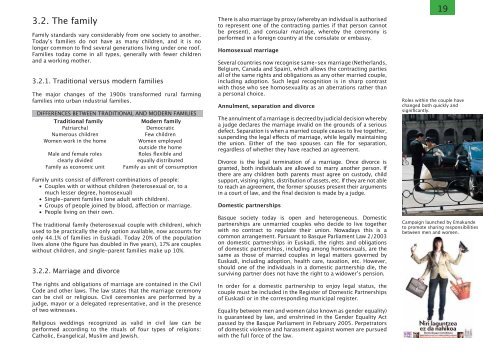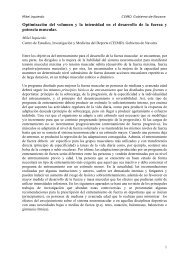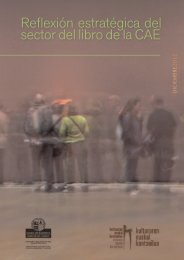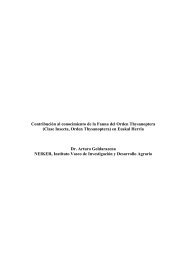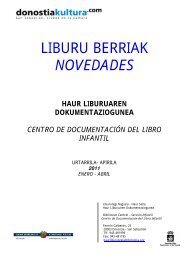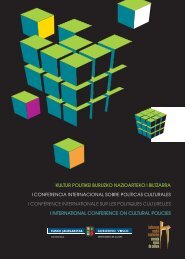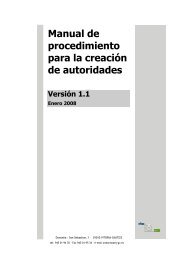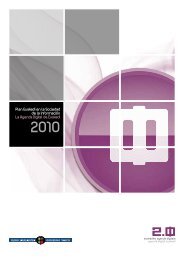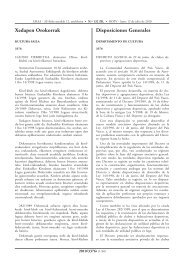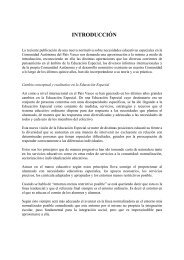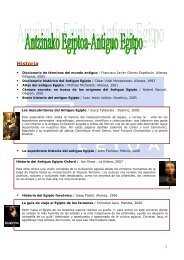The Basque Country (pdf, 4,3Mb) - Kultura Saila - Euskadi.net
The Basque Country (pdf, 4,3Mb) - Kultura Saila - Euskadi.net
The Basque Country (pdf, 4,3Mb) - Kultura Saila - Euskadi.net
Create successful ePaper yourself
Turn your PDF publications into a flip-book with our unique Google optimized e-Paper software.
3.2. <strong>The</strong> family<br />
Family standards vary considerably from one society to another.<br />
Todayʼs families do not have as many children, and it is no<br />
longer common to find several generations living under one roof.<br />
Families today come in all types, generally with fewer children<br />
and a working mother.<br />
3.2.1. Traditional versus modern families<br />
<strong>The</strong> major changes of the 1900s transformed rural farming<br />
families into urban industrial families.<br />
DIFFERENCES BETWEEN TRADITIONAL AND MODERN FAMILIES<br />
Traditional family Modern family<br />
Patriarchal<br />
Democratic<br />
Numerous children<br />
Few children<br />
Women work in the home<br />
Women employed<br />
outside the home<br />
Male and female roles<br />
Roles flexible and<br />
clearly divided<br />
equally distributed<br />
Family as economic unit Family as unit of consumption<br />
Family units consist of different combinations of people:<br />
• Couples with or without children (heterosexual or, to a<br />
much lesser degree, homosexual)<br />
• Single-parent families (one adult with children).<br />
• Groups of people joined by blood, affection or marriage.<br />
• People living on their own.<br />
<strong>The</strong> traditional family (heterosexual couple with children), which<br />
used to be practically the only option available, now accounts for<br />
only 44.1% of families in <strong>Euskadi</strong>. Today 20% of the population<br />
lives alone (the figure has doubled in five years), 17% are couples<br />
without children, and single-parent families make up 10%.<br />
3.2.2. Marriage and divorce<br />
<strong>The</strong> rights and obligations of marriage are contained in the Civil<br />
Code and other laws. <strong>The</strong> law states that the marriage ceremony<br />
can be civil or religious. Civil ceremonies are performed by a<br />
judge, mayor or a delegated representative, and in the presence<br />
of two witnesses.<br />
Religious weddings recognized as valid in civil law can be<br />
performed according to the rituals of four types of religions:<br />
Catholic, Evangelical, Muslim and Jewish.<br />
<strong>The</strong>re is also marriage by proxy (whereby an individual is authorised<br />
to represent one of the contracting parties if that person cannot<br />
be present), and consular marriage, whereby the ceremony is<br />
performed in a foreign country at the consulate or embassy.<br />
Homosexual marriage<br />
Several countries now recognise same-sex marriage (Netherlands,<br />
Belgium, Canada and Spain), which allows the contracting parties<br />
all of the same rights and obligations as any other married couple,<br />
including adoption. Such legal recognition is in sharp contrast<br />
with those who see homosexuality as an aberrations rather than<br />
a personal choice.<br />
Annulment, separation and divorce<br />
<strong>The</strong> annulment of a marriage is decreed by judicial decision whereby<br />
a judge declares the marriage invalid on the grounds of a serious<br />
defect. Separation is when a married couple ceases to live together,<br />
suspending the legal effects of marriage, while legally maintaining<br />
the union. Either of the two spouses can file for separation,<br />
regardless of whether they have reached an agreement.<br />
Divorce is the legal termination of a marriage. Once divorce is<br />
granted, both individuals are allowed to marry another person. If<br />
there are any children both parents must agree on custody, child<br />
support, visiting rights, distribution of assets, etc. If they are not able<br />
to reach an agreement, the former spouses present their arguments<br />
in a court of law, and the final decision is made by a judge.<br />
Domestic partnerships<br />
<strong>Basque</strong> society today is open and heterogeneous. Domestic<br />
partnerships are unmarried couples who decide to live together<br />
with no contract to regulate their union. Nowadays this is a<br />
common arrangement. Pursuant to <strong>Basque</strong> Parliament Law 2/2003<br />
on domestic partnerships in <strong>Euskadi</strong>, the rights and obligations<br />
of domestic partnerships, including among homosexuals, are the<br />
same as those of married couples in legal matters governed by<br />
<strong>Euskadi</strong>, including adoption, health care, taxation, etc. However,<br />
should one of the individuals in a domestic partnership die, the<br />
surviving partner does not have the right to a widowerʼs pension.<br />
In order for a domestic partnership to enjoy legal status, the<br />
couple must be included in the Register of Domestic Partnerships<br />
of <strong>Euskadi</strong> or in the corresponding municipal register.<br />
Equality between men and women (also known as gender equality)<br />
is guaranteed by law, and enshrined in the Gender Equality Act<br />
passed by the <strong>Basque</strong> Parliament in February 2005. Perpetrators<br />
of domestic violence and harassment against women are pursued<br />
with the full force of the law.<br />
19<br />
Roles within the couple have<br />
changed both quickly and<br />
significantly.<br />
Campaign launched by Emakunde<br />
to promote sharing responsibilities<br />
between men and women.


